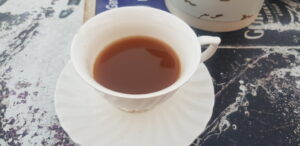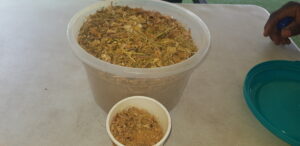As far back as 1989, an investigation by the United Nations’ World Health Organisation (WHO) revealed that taking more tea and smoking less was one of the mysteries of human longevity. 21st Century Chronicle reports that more people are taking to tea drinking in Abuja, Nigeria’s capital city, while owners of tea businesses continue to cash out.
It’s a hot evening in Abuja and Sam, as he simply introduced himself, is sitting out with colleagues in one of Abuja’s recreational gardens, having just closed from the office, closeby. You’d expect them to be having cold drinks, considering the sweltering weather, but cup after cup, they pour from a flask, what is later found out to be a mélange of herbal teas.
 Taking a sip from a steaming cup, he explains that ever since he found the tea spot, it has become an almost daily routine to stop there for a few cups at the close of work.
Taking a sip from a steaming cup, he explains that ever since he found the tea spot, it has become an almost daily routine to stop there for a few cups at the close of work.
“The tea helps me sleep well,” he said.
Asked if he knows the different ingredients in the tea mix and if they were good for his health, he said “I’ve truly never bothered. I can, however, tell from the taste and aroma that it contains lemon, ginger, honey, cloves, lemon grass and other herbs which are good for the body, especially with COVID-19 and the need to take immunity boosting foods and spices.”
Tea statistics
Tea has been ranked as the second most popular beverage in the world, after water. According to the Global Tea Market Size 2018-2026 report by Statista, the global tea market was valued at over $52 billion in 2018 and is projected to rise to over $81 billion by 2026.
A 2016 report by the Food and Agriculture Organisation (FAO) revealed that there are about 50 countries and regions where tea is grown, and more than 160 countries and regions have tea drinking habits, while approximately 3 billion people around the world consume tea.
China, India and Kenya are among the largest producers of tea in the world. China has been the largest producer and consumer in the world since 2010. The production scale of the Chinese tea industry has continued to expand rapidly with the total area planted increasing from 1.9702 million hectares in 2010 to 2.965 million hectares in 2016, with a year-on-year growth rate of 3.05 per cent. The total tea production in China in 2016 reached 2.445 million tons. In 2017 alone, China produced over 2.5 million metric tons of tea. Pakistan, imports the most tea worldwide, with over half a billion US dollars’ worth in 2017 alone.
In 2016, FAO in a report, projected that global tea consumption would continue to rise over the next decade, attributing the predicted rise to high demand in countries such as India, China and other emerging economies. The report noted that for these countries, the rise was predicated on health and general well-being benefits.
In the USA, for instance, tea is said to be found in almost 80 per cent of households and is one of the beverages commonly served for any occasion. According to the Tea Association of the USA, tea is drank by over 158 million Americans on any given day. In the UK, approximately 165 million cups of tea are consumed daily. Statistics by the Tea Association in 2015 showed that black tea accounted for 69.6 per cent of the total sales of the UK tea market, followed by fruit and herbal tea, green tea, specialty tea and other teas. In 2016, Turkish people consumed on average, nearly seven pounds each of tea.
Tea consumption in Nigeria, Abuja
Although on individual basis, there are quite a number of tea drinkers in Nigeria, green and herbal tea consumption, with businesses that offer such services, are a more recent phenomenon, findings by 21st Century Chronicle reveal.
In Nigeria, many people erroneously refer to  hot chocolate drinks as tea, but tea is actually made by pouring hot water over loose or bagged cured tea leaves. Though there isn’t much statistics on tea consumption, one research by Fitch Solutions shows that tea or cocoa are the hot drinks of choice for the average Nigerian and are projected to account for about 40 per cent of Nigeria’s spending on non-alcoholic beverages by 2023.
hot chocolate drinks as tea, but tea is actually made by pouring hot water over loose or bagged cured tea leaves. Though there isn’t much statistics on tea consumption, one research by Fitch Solutions shows that tea or cocoa are the hot drinks of choice for the average Nigerian and are projected to account for about 40 per cent of Nigeria’s spending on non-alcoholic beverages by 2023.
Recently, in Nigeria, a lot of people are ditching fizzy drinks and soda for more healthy beverages such as water and natural/herbal teas. There is a growing consciousness about natural foods with healthy offerings and demand for such foods, including naturally healthy teas with known benefits, seem to be increasing among consumers.
Call it a fad if you like, but it is fast growing in popularity and savvy entrepreneurs are cashing in on the trend, as evident in the rising number of tea retail outlets/cafes springing up in cities like Abuja.
It is no longer unusual to find friends and business associates just lounging or closing deals over cups of tea in one of the city’s cafes.

Shayi Masters, located in Abuja’s City Park is one of such places. With a tagline that invites you to “Join the community of happy sippers,” Shayi Masters offer a variety of teas priced for between N1,000 and N2,000 a flask to tea lovers who throng the spot especially in the evenings.
 The manager, Tasiu Usman, told 21st Century Chronicle that the business started operating three months ago and was borne out of the owner’s interest in tea and lack of conducive places around the city where he could sit out with friends just to take tea.
The manager, Tasiu Usman, told 21st Century Chronicle that the business started operating three months ago and was borne out of the owner’s interest in tea and lack of conducive places around the city where he could sit out with friends just to take tea.
“Since starting this business, one thing we’ve come to realise is that Nigerians don’t know the difference between chocolate drinks and tea. People often come here to ask for those kinds of ‘tea’ but that’s not what we sell.
“Our teas are herbal. We have the normal tea made from lemon grass, honey, ginger, mint herb from Arabia and other ingredients. We also have the Goriba tea, which major ingredient is a fruit (Doum Palm Fruit) rich in medicinal benefits, particularly for high blood pressure and traditional to the northern part of the country. These teas besically help to detoxify the body of toxins, clear the airways, help with weight loss and general well being. We also have our special order tea, which has aphrodisiac properties, which is also high in demand.”
Usman said on average, 30 to 50 jugs of tea are sold daily, adding that because of the high customer turnout, the suya spot next to its business, which hitherto witnessed low patronage has witnessed a boom in sales as people often want some protein to go with the tea.
“So you can see, we are not only making money for ourselves but contributing to boosting other businesses too,” he added.
A tea enthusiast, Thomas Oliver, said even though he always loved the beverage, he had to ditch every other drink for tea, after the doctor announced to him during a routine health check that he was borderline diabetic.
According to him, he had since found out that tea is one of the most natural drinks, with no calories, sugar, salt or other additives and contains helpful compounds for disease prevention.
“It’s no surprise that more people are taking to tea consumption. I’ll say the interest is fuelled by the quest for better health, longevity and all of the other benefits derived from eating natural foods. It is definitely better than gulping sugar in carbonated drinks. I’ve noticed the difference in my health since I started taking more green tea, precisely. My sugar level is now withing healthy range and even my overly high blood pressure has normalised,” he added.
At the Arabian Tea Spot in Floris Garden, Wuse Zone 3, Eunice, a senior staffer, said a lot of people are catching up with the trend, as evident in the number of people who visit the spot daily.
Here, a 1 litre flask of tea is sold for N1,000 and contains up to six standard tea cup servings.
“They obviously like what we serve that’s why they keep coming back,” she said, when asked about feedback they’ve been receiving from customers.
According to her, basic ingredients for the tea include ginger, lemon grass, cinnamon, turmeric, honey, lemon and black pepper.
On the number of people who visit the spot and number of tea flasks sold daily, even though she declined a specific figure, she admitted that it was in the neighbourhood of 100 flasks daily.
Bliss Arabian Tea, Kubwa, is another spot that offers what the manager, Emmanuel Abah, termed “a combination of healthy herbs from Arabia.”
Opened about a year ago, the business gets on average, 20 customers daily.
Explaining how the different tea mixes on offer are arrived at, he pointed out that even though he is not a health expert, he reads extensively and his wife, a lab scientist, helps with the chemistry of the tea preparation.
“There is a science behind how it is prepared. Not everyone can mix the right proportions,” Abah stated.
He listed benefits of tea consumption to include “detoxification without purging, clearing puffiness around the belly and also helps with weight loss help with bowel movement and emptying,” adding that customers, especially new ones, are usually educated about these benefits when they visit the spot.
He disclosed that apart from the regular teas and the immunity boosting ones, specially formulated in the wake of the COVID-19 pandemic, there were also special teas for libido enhancement, which were in high demand by customers.
Asked if there were any side effects of herbal tea consumption, he said there was none.
Nutritionist warns of harmful effects

Speaking on the growing trend, Founder and Head Nutritionist at Sob Nutrition, Simbiat Oladoja, said the trend can be attributed to culture and the growing awareness on healthy eating and living.
“In the northern part of the country for instance, where they have extreme weathers, tea drinking is a part of the culture and it is common to find local tea spots at every corner. Then people are becoming more aware to the extent that green tea, for instance, is becoming very popular among people for its many benefits which include presence of antioxidants for elimination of free radicals from the body, weight loss among others.”
She, however, cautioned that while tea is good, not every tea can be consumed by everyone, especially the herbal concoctions served at many of the tea spots, hence the need for people to carry out medical checks to know their health status before going with the trend.
“We as a people do not have a culture of checking our health status but it is good to know, to guide us on the kinds of food to eat, to know what we are allergic to and all that,” she said.
The nutritionist stated that “Lemon tea, for instance, is not good for people that have ulcers especially if taken on empty stomach. It could have adverse effects. Personally, I don’t take anything that has caffeine because I am allergic to it. If I must take coffee, it has to be decaffeinated. Those who are not aware that they have this allergy may take it and the effects may be detrimental to their health.”
“There are also teas that should not be taken by pregnant women or women trying to conceive. For instance, I have a client who is trying to get pregnant but after going through her diet history, I found out she has been taking a particular tea and the active ingredient in it is detrimental to her health goals.”
Oladoja concluded by saying that when it comes to teas, it is quite complex when you look at it nutritionally, pointing out that while tea is good when the right ones are taken by the right people, taking the wrong ones could be detrimental to the health.
“It is a decision that should be made in consultation with your nutritionist after carrying out necessary health tests,” she said.








